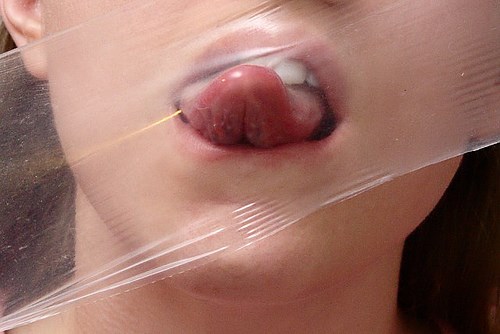What the hell is a dental dam and why does my sex-ed textbook recommend it?
The clinical definition of safe sex is to use a condom or ‘dental dam’ in all penetrative AND oral sex. But what the hell is a dental dam? Is anyone wearing a rubber during a blowjob?
A dental dam is a sheet of latex, kind of like a condom that is flat. It’s used to put on a vagina or butt when giving oral, and it protects you from giving or receiving infections orally. And although article a every google search about ‘safe sex’ brings up will mention these contraptions, no one has ever actually seen one at the 7/11 checkout.
Pro tip: If you ever really need a dental dam and you aren’t intrepid enough to source one, cutting a condom length-wise from the base to the top forms a sheet latex you can use. This writer experimented on a lurid banana flavoured condom from O-Week 2014 and can confirm it would probably work.
Furthermore, wearing a condom during a blowjob? I’m sure many have never even considered it as necessary regardless of what the guidelines say. As much as our Year 9 Health teachers would like to be in the bedroom with us, this is an area where we have to go it alone and make our own decisions about our safety.
Most STIs can indeed be transferred orally:
- Herpes (a cold sore) has a high risk of infection through oral sex, though it is easy to avoid as herpes breakouts are quite noticeable and the virus rarely sheds without symptoms.
- Chlamydia, gonorrhea and syphilis can all result in various throat infections.
- HPV (genital warts and asymptomatic infection) is related to throat cancers, and often when someone gets a HPV-related cancer it’s highly correlated with the number of oral sex partners they’ve had.
- HIV can be transmitted from genitals to mouth, particularly from penis to mouth where the penis has HIV. Other forms of oral are very low risk, and receiving oral from someone with HIV (ie. HIV mouth on your bits) is also very low risk.
You’re most likely to get something treatable from oral sex, like a throat infection, or something easily manageable like herpes. HPV is a concern – most often it is asymptomatic and is highly to cause cancer. However most people our age have been immunised against HPV in highschool which is drastically reducing rates of transmission (yay immunisation! Another win for science). HIV is highly dangerous but the risk of transmission is low for oral sex (some scientists believe it’s never even happened).
So you probably won’t die if you don’t use protection during oral sex. If you’re getting regularly tested, you’ll be able to spot the treatable infections early and be safe. But ultimately, it shouldn’t be strange to request protection in oral sex. This is a conversation we all need to be having, with ourselves, with our friends and with our sexy-time buddies. And if you aren’t getting regularly tested, don’t think you’re safe just because you always wrap it up. You’re still at risk, get tested and take charge of your health.


